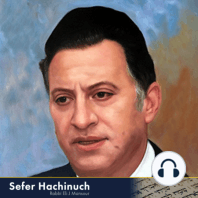20 min listen
Misva #122: Giving Testimony
FromSefer Hachinuch
ratings:
Length:
20 minutes
Released:
Jan 20, 2022
Format:
Podcast episode
Description
The Torah in Parashat Vayikra (5:1) says about somebody who has information that could be used as testimony in Bet Din, “Im Lo Yagid Ve’nasa Avono” – “If he does not speak, then he shall bear his iniquity.” This establishes a Biblical command requiring those who are able to serve as witnesses and testify before Bet Din to do so. When it comes to Dineh Mamonot (civil disputes), one is required to testify only if he is summoned to the court. When it comes to Dineh Nefashot (capital cases), one who witnesses a crime must come to court and testify even if he is not summoned, in order to ensure public safety by having criminals prosecuted. The Sefer Ha’hinuch notes a number of exceptions to this Misva. A Torah scholar is not required to testify before a court of a lower scholarly caliber, as this would be beneath his dignity, and the command to show respect to Torah scholars overrides the command to testify. Similarly, a Kohen Gadol is not required to testify, because of his unique stature. A special enactment was made that kings do not testify and are not testified against. Kings of Malchut Bet David (the Davidic dynasty), however, do testify, and are testified against. Although a judge cannot preside over a case involving a close friend, as he would be unable to maintain strict impartiality, a witness may testify for or against a friend, or for or against an enemy. The verse in the Book of Sefanya (3:13) says, “She’erit Yisrael Lo Ya’asu Avla” – “The remnant of Israel does not commit injustice.” Jews are not suspected of acting dishonestly, and thus we do not suspect that a witness would falsely testify in favor of a friend or against an enemy. Once witnesses deliver testimony in Bet Din, they cannot then retract their testimony; Bet Din acts upon their testimony even if they later say that it is not true. This rule is known as “Kevan She’higgid Shub Eno Hozer U’maggid” (“Once he spoke, he cannot then say something different”). A document signed by two witnesses is accepted in Bet Din as authoritative, just like two witnesses verbally testifying before Bet Din. Thus, for example, if a document states that Reuben lent Shimon money, and two witnesses signed the document, Bet Din will require Shimon to pay Reuben the stipulated amount on the basis of this document. The Rambam was of the opinion that this is a provision enacted by the Sages. According to the Rambam, Torah law does not regard a Shetar (document) as valid testimony, but the Sages instituted the use of signed documents because otherwise, prospective lenders would be reluctant to lend money. If people knew that they would have to bring the witnesses to court to prove that they lent money, they would be discouraged from lending, and so the Sages enacted that a Shetar signed by two witnesses should have the legal power of two witnesses. The Ramban disagreed, and maintained that a Shetar functions as valid testimony on the level of Torah law, and not merely by force of Rabbinic enactment. Bet Din accepts a Shetar as authoritative only after first verifying the authenticity of the witnesses’ signatures. There are several different ways in which this can be done. One is to have two witnesses come and testify to the signatures’ authenticity, stating that they recognize the witnesses’ signatures. Even relatives – who are normally disqualified from serving as witnesses – can serve as witnesses to authenticate signatures on a Shetar. The judges themselves can also authenticate the signatures if they happen to recognize the witnesses’ signatures. And, of course, the witnesses themselves can come to court and verify that they were the ones who signed the document. Another method is to compare the signatures with these witnesses’ signatures on other documents. The Sefer Ha’hinuch notes that this Halacha applies in all times and places, and that it applies only to males, as females do not serve as witnesses because “Da’atan Kalot” (literally, “their minds are weak”). This should not
Released:
Jan 20, 2022
Format:
Podcast episode
Titles in the series (100)
Misva #8: Leaving Over Meat of the Korban Pesach: Daily Sefer Hachinuch - Brought to you by itorah.com by Sefer Hachinuch
